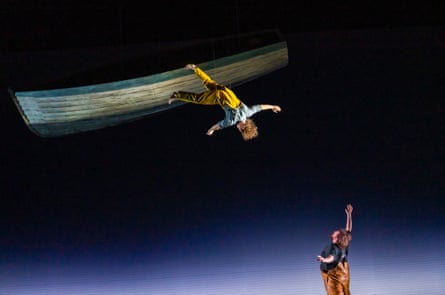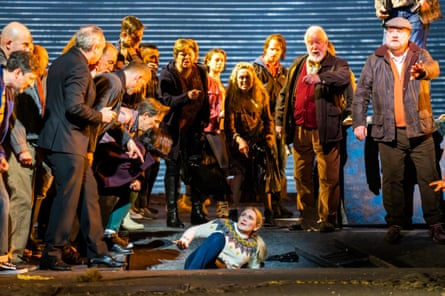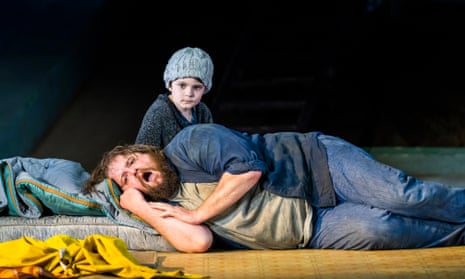The Royal Opera’s new Peter Grimes is a co-production with Madrid’s Teatro Real, where it was first seen, and hugely admired, last year. Conducted by Mark Elder, directed by Deborah Warner, and superbly cast, with Allan Clayton tremendous in the title role, it’s an angry, confrontative, rightly unsettling interpretation of Britten’s first great examination of the relationship between the outsider and society.
Warner hauls the opera into the here and now, reimagining The Borough as a decayed, isolated coastal town in post-Brexit Britain, a place of boarded-up shop fronts and desperate poverty where hatred, blame and prejudice fester amid the deprivation, and where a loner such as Clayton’s Grimes almost inevitably becomes the victim of a community looking for a scapegoat. Warner’s approach is by no means naturalistic, though: the Prologue is staged as an expressionist dream as Grimes sleeps on the shore and an aerialist (Jamie Higgins) hovers overhead as thoughts of his first apprentice’s horrific death begin to erode Grimes’s mind.

The inhabitants of this hellhole, meanwhile, are characterised in often painstaking detail, down to every last member of the chorus, and much of the production’s power derives from Warner’s exploration of the way individuality becomes subsumed into the collective when mob violence takes over. Far-right thugs, lurking among the crowd, harass and threaten Maria Bengtsson’s affectionate Ellen for taking Grimes’s side. Bryn Terfel’s assertive yet compassionate Balstrode is the only person this community seemingly respects. Just occasionally, though, the updating grates against the work: that Grimes should have boy apprentices, in particular, comes over as anachronistic in the new context.
Musically, it’s often astonishing, with Clayton and Elder (the latter conducting the work for the first time in the UK) effectively the evening’s heroes. In what is arguably the finest performance of his career to date, Clayton makes a heartbreaking, supremely lyrical Grimes, singing with remarkable sensitivity and great refinement of tone. Now the Great Bear and Pleiades, done cowering against the pub door with his back to the audience, is a ravishing exploration of the visionary, poetic soul beneath the man’s rough exterior. Elder, meanwhile, emphasises the score’s beauty as well as its violence. Textures are lean and sinewy rather than post-Romantic and full. Berg’s influence is very apparent, as is Britten’s debt to Strauss in the Act II quartet.

Though her voice is not large, Bengtsson makes a fine Ellen, self-assured and dignified even when victimised. Her Embroidery Aria is exquisitely done. Terfel’s worldly-wise Balstrode is exemplary, too, sung and acted with admirable warmth and restrained intensity. The inhabitants of the Borough are played by a fine ensemble of singers, though Jacques Imbrailo’s handsome, wide-boy Ned Keene and John Graham-Hall’s truly alarming Bob Boles are particularly outstanding. The choral singing is wonderful.
At Royal Opera House, London, until 31 March. It is being recorded for streaming at a future date. Check stream.roh.org.uk
See also

Comments (…)
Sign in or create your Guardian account to join the discussion